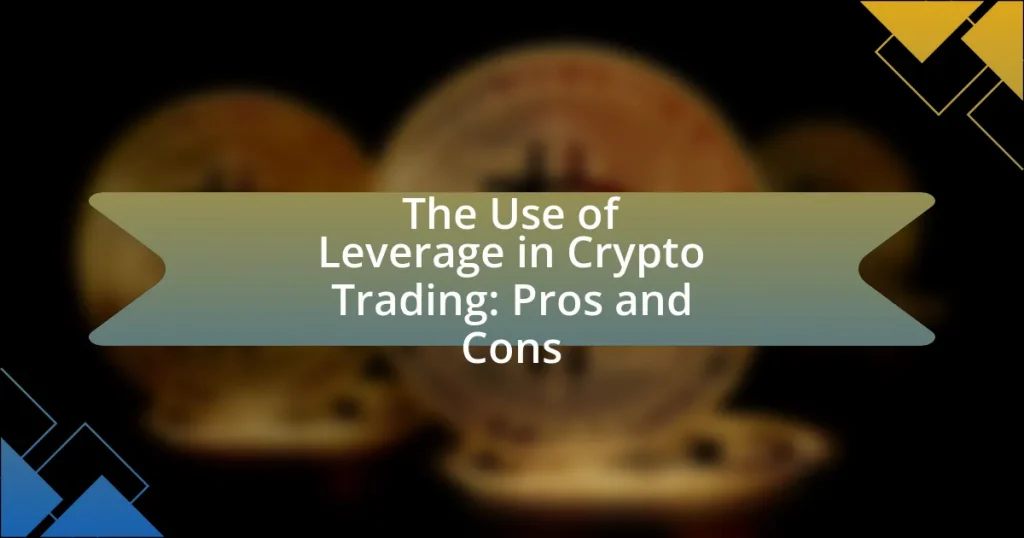Consumer protection laws in crypto trading are essential regulations aimed at safeguarding investors from fraud, misinformation, and unfair practices within the cryptocurrency market. These laws mandate transparency from crypto exchanges, requiring clear disclosures about risks, fees, and terms of service. The article explores how these regulations apply to cryptocurrency exchanges, the specific laws governing their operations, and the rights consumers have under these frameworks. It also addresses the challenges in enforcing these laws, the limitations of current regulations, and best practices for consumers to protect themselves in a rapidly evolving and often volatile market. Additionally, the article highlights the differences in consumer protection laws across jurisdictions, particularly between the United States and the European Union, and the impact of international regulations on global crypto trading.

What are Consumer Protection Laws in the Context of Crypto Trading?
Consumer protection laws in the context of crypto trading are regulations designed to safeguard investors from fraud, misinformation, and unfair practices in the cryptocurrency market. These laws aim to ensure transparency, requiring crypto exchanges and platforms to disclose risks, fees, and terms of service clearly. For instance, the U.S. Securities and Exchange Commission (SEC) has implemented regulations that classify certain cryptocurrencies as securities, thereby subjecting them to existing securities laws that protect investors. Additionally, the Financial Conduct Authority (FCA) in the UK has established guidelines to prevent scams and promote fair treatment of consumers in crypto transactions. These regulatory frameworks are essential for fostering trust and stability in the rapidly evolving crypto trading environment.
How do these laws apply to cryptocurrency exchanges?
Consumer protection laws apply to cryptocurrency exchanges by requiring them to adhere to regulations that ensure transparency, fairness, and security for users. These laws mandate that exchanges implement measures to protect consumers from fraud, misleading practices, and financial losses. For instance, in the United States, the Securities and Exchange Commission (SEC) and the Commodity Futures Trading Commission (CFTC) oversee exchanges to ensure compliance with securities laws and anti-fraud provisions. Additionally, exchanges must provide clear disclosures about risks associated with trading cryptocurrencies, as outlined in the Financial Industry Regulatory Authority (FINRA) guidelines. This regulatory framework aims to foster a safer trading environment and enhance consumer trust in the cryptocurrency market.
What regulations govern the operation of crypto exchanges?
Regulations governing the operation of crypto exchanges primarily include anti-money laundering (AML) laws, know your customer (KYC) requirements, and securities regulations. In many jurisdictions, crypto exchanges must comply with AML laws to prevent illicit activities, which often involves verifying the identities of their users through KYC processes. Additionally, if a cryptocurrency is classified as a security, exchanges must adhere to securities regulations set forth by financial authorities, such as the U.S. Securities and Exchange Commission (SEC). These regulations aim to protect consumers and ensure the integrity of the financial system by enforcing transparency and accountability within the crypto trading environment.
How do these regulations protect consumers from fraud?
Consumer protection regulations safeguard individuals from fraud by establishing clear guidelines and standards for transparency and accountability in crypto trading. These regulations require companies to disclose essential information about their operations, including risks associated with investments, thereby enabling consumers to make informed decisions. For instance, the implementation of the Anti-Money Laundering (AML) and Know Your Customer (KYC) regulations mandates that crypto exchanges verify the identities of their users, which helps prevent fraudulent activities and protects consumers from scams. Additionally, regulatory bodies can impose penalties on companies that engage in deceptive practices, further deterring fraud and enhancing consumer trust in the market.
Why are consumer protection laws important for crypto traders?
Consumer protection laws are important for crypto traders because they provide a framework that safeguards investors from fraud, scams, and market manipulation. These laws help ensure transparency and accountability in the rapidly evolving cryptocurrency market, which is often characterized by high volatility and a lack of regulation. For instance, the implementation of the Securities and Exchange Commission’s regulations in the United States has led to increased scrutiny of initial coin offerings (ICOs) and trading platforms, thereby reducing the risk of fraudulent activities. By establishing clear guidelines and standards, consumer protection laws enhance trust in the market, encouraging more individuals to participate in crypto trading while promoting fair practices among traders and exchanges.
What risks do consumers face in crypto trading?
Consumers face several risks in crypto trading, including market volatility, security vulnerabilities, and regulatory uncertainty. Market volatility can lead to significant financial losses, as cryptocurrencies often experience rapid price fluctuations. Security vulnerabilities arise from hacking incidents, where exchanges or wallets can be compromised, resulting in the loss of funds. Regulatory uncertainty poses a risk as laws governing cryptocurrencies vary by jurisdiction and can change, potentially affecting the legality and operation of trading platforms. According to a report by the Financial Stability Board, the lack of consumer protection measures in the crypto space increases the likelihood of fraud and scams, further heightening the risks for consumers.
How do these laws enhance consumer confidence in the market?
Consumer protection laws enhance consumer confidence in the market by establishing clear regulations that safeguard buyers from fraud and unethical practices. These laws create a structured environment where consumers feel secure in their transactions, knowing that there are legal recourses available in case of disputes. For instance, regulations requiring transparency in crypto trading platforms ensure that consumers are informed about risks and fees, which builds trust. Additionally, enforcement of anti-fraud measures and the requirement for platforms to adhere to security standards further reassure consumers that their investments are protected. This legal framework not only deters malicious activities but also promotes a fair trading environment, ultimately fostering greater participation in the market.

What are the Key Features of Consumer Protection Laws in Crypto Trading?
Key features of consumer protection laws in crypto trading include transparency requirements, fraud prevention measures, and dispute resolution mechanisms. Transparency requirements mandate that crypto exchanges disclose essential information about their operations, fees, and risks associated with trading. Fraud prevention measures involve regulations that protect consumers from deceptive practices, ensuring that exchanges implement security protocols to safeguard user funds. Dispute resolution mechanisms provide consumers with avenues to resolve conflicts with exchanges, often through regulatory bodies or arbitration processes. These features aim to enhance consumer trust and safety in the rapidly evolving crypto market.
What rights do consumers have under these laws?
Consumers have the right to protection against unfair practices under consumer protection laws in crypto trading. These laws ensure that consumers receive accurate information about products and services, enabling informed decision-making. Additionally, consumers are entitled to seek redress for fraudulent activities, such as scams or misleading advertisements, which are prevalent in the crypto market. For instance, the Federal Trade Commission (FTC) reported that consumers lost over $80 million to cryptocurrency scams in 2020, highlighting the necessity of these protections. Furthermore, consumers have the right to privacy and security of their personal data, as mandated by various regulations, ensuring that their information is not misused by crypto platforms.
How can consumers seek redress for violations?
Consumers can seek redress for violations by filing complaints with regulatory agencies, pursuing mediation or arbitration, and initiating legal action. Regulatory agencies, such as the Federal Trade Commission (FTC) or the Commodity Futures Trading Commission (CFTC), provide platforms for consumers to report fraudulent activities and seek assistance. Mediation or arbitration services can offer a less formal resolution process, often outlined in the terms of service of crypto platforms. If these avenues do not yield satisfactory results, consumers may file lawsuits in civil court, where they can seek damages for losses incurred due to violations of consumer protection laws. These methods are supported by consumer protection laws that aim to safeguard individuals against unfair practices in the marketplace.
What are the penalties for non-compliance by crypto platforms?
Penalties for non-compliance by crypto platforms can include hefty fines, operational restrictions, and potential criminal charges. Regulatory bodies, such as the Financial Crimes Enforcement Network (FinCEN) and the Securities and Exchange Commission (SEC) in the United States, impose fines that can reach millions of dollars for violations of anti-money laundering (AML) and securities laws. For instance, in 2021, a major crypto exchange was fined $100 million for failing to implement adequate AML procedures. Additionally, non-compliance can lead to the suspension of trading activities or revocation of licenses, severely impacting the platform’s ability to operate. In extreme cases, individuals responsible for compliance failures may face criminal prosecution, resulting in imprisonment.
How do these laws vary across different jurisdictions?
Consumer protection laws in crypto trading vary significantly across different jurisdictions due to differing regulatory frameworks and approaches to digital assets. For instance, the United States employs a combination of federal and state regulations, with agencies like the SEC and CFTC overseeing various aspects of crypto trading, while states like New York have implemented the BitLicense framework, which imposes strict compliance requirements. In contrast, the European Union is working towards a unified regulatory approach through the Markets in Crypto-Assets (MiCA) regulation, which aims to provide a comprehensive legal framework for crypto assets across member states. Additionally, countries like China have imposed outright bans on crypto trading, reflecting a more restrictive stance compared to jurisdictions like Switzerland, which has embraced crypto innovation with supportive regulations. These variations illustrate how local legal environments shape the consumer protection landscape in crypto trading.
What are the differences in consumer protection laws in the US versus the EU?
Consumer protection laws in the US differ significantly from those in the EU, primarily in their scope and enforcement mechanisms. In the US, consumer protection is largely decentralized, with various federal and state agencies, such as the Federal Trade Commission, overseeing different aspects, leading to a patchwork of regulations. In contrast, the EU has a more unified approach, with comprehensive regulations like the General Data Protection Regulation and the Consumer Rights Directive that apply uniformly across member states. This EU framework emphasizes stronger consumer rights, including the right to withdraw from contracts and enhanced protections against unfair commercial practices. Additionally, the EU’s enforcement mechanisms allow for collective actions, which are less common in the US, where individual lawsuits dominate.
How do international regulations impact global crypto trading?
International regulations significantly impact global crypto trading by establishing legal frameworks that govern transactions, enhance consumer protection, and promote market integrity. These regulations vary by jurisdiction, influencing how cryptocurrencies are traded, the compliance requirements for exchanges, and the legal status of digital assets. For instance, the Financial Action Task Force (FATF) guidelines mandate that countries implement measures to combat money laundering and terrorist financing in crypto transactions, which affects how exchanges operate globally. Additionally, the European Union’s Markets in Crypto-Assets (MiCA) regulation aims to create a unified regulatory framework across member states, thereby fostering a safer trading environment and increasing investor confidence. Such regulations can lead to increased legitimacy and stability in the crypto market, ultimately shaping trading practices and consumer trust on a global scale.

What Challenges Exist in Enforcing Consumer Protection Laws in Crypto Trading?
Enforcing consumer protection laws in crypto trading faces significant challenges due to the decentralized nature of cryptocurrencies, which complicates regulatory oversight. The anonymity of transactions and the lack of a central authority make it difficult for regulators to track fraudulent activities and hold bad actors accountable. Additionally, the rapid evolution of technology and the crypto market outpaces existing legal frameworks, leaving gaps in regulation. For instance, a report by the Financial Stability Board highlights that many jurisdictions lack comprehensive regulations specifically tailored to address the unique risks associated with crypto assets. This regulatory uncertainty can lead to inconsistent enforcement and consumer confusion, further complicating the protection of investors in this volatile market.
What are the limitations of current consumer protection laws?
Current consumer protection laws face significant limitations in addressing the unique challenges posed by crypto trading. These laws often lack specific provisions tailored to the rapidly evolving nature of cryptocurrencies, leading to gaps in regulation. For instance, many jurisdictions do not classify cryptocurrencies as traditional financial instruments, which results in inadequate oversight and enforcement mechanisms. Additionally, the decentralized and anonymous nature of crypto transactions complicates the ability to trace fraud or misconduct, leaving consumers vulnerable to scams and market manipulation. Furthermore, existing laws may not provide sufficient recourse for consumers in cases of loss or theft, as traditional consumer rights protections do not always extend to digital assets.
How do technological advancements complicate enforcement?
Technological advancements complicate enforcement by creating new avenues for illicit activities that are difficult to monitor and regulate. For instance, the rise of decentralized finance (DeFi) platforms allows users to conduct transactions without intermediaries, making it challenging for regulatory bodies to track and enforce compliance with consumer protection laws. Additionally, the use of blockchain technology, while providing transparency, also enables anonymity, which can hinder the identification of bad actors. According to a report by the Financial Action Task Force (FATF), the pseudonymous nature of cryptocurrencies poses significant challenges for law enforcement agencies in tracing illicit transactions and enforcing regulations effectively.
What role do decentralized finance (DeFi) platforms play in these challenges?
Decentralized finance (DeFi) platforms play a significant role in the challenges related to consumer protection in crypto trading by providing an alternative to traditional financial systems that often lack transparency and regulatory oversight. These platforms enable users to engage in financial transactions without intermediaries, which can lead to increased risks such as fraud, market manipulation, and lack of recourse in case of disputes. For instance, a report by the Financial Action Task Force (FATF) highlights that the pseudonymous nature of DeFi transactions complicates the enforcement of consumer protection laws, making it difficult for regulators to track illicit activities and protect consumers effectively. Thus, while DeFi platforms offer innovative financial solutions, they also exacerbate existing challenges in ensuring consumer safety and regulatory compliance in the crypto trading landscape.
How can consumers protect themselves in the absence of strong regulations?
Consumers can protect themselves in the absence of strong regulations by conducting thorough research on cryptocurrency platforms and utilizing secure practices. This includes verifying the legitimacy of exchanges through user reviews, checking for regulatory compliance in their jurisdiction, and ensuring the platform employs robust security measures such as two-factor authentication. According to a report by the Financial Conduct Authority, 20% of cryptocurrency users have experienced fraud, highlighting the importance of vigilance. Additionally, consumers should diversify their investments and avoid putting all funds into a single asset or platform, which mitigates risk.
What best practices should consumers follow when trading cryptocurrencies?
Consumers should follow several best practices when trading cryptocurrencies to ensure safety and informed decision-making. First, they should conduct thorough research on the cryptocurrencies they intend to trade, including understanding the technology, market trends, and potential risks. According to a 2021 report by the Financial Conduct Authority, 14% of UK adults owned cryptocurrencies, highlighting the importance of informed trading to mitigate risks associated with volatility and scams.
Second, consumers should use reputable exchanges and wallets that implement strong security measures, such as two-factor authentication and cold storage. The 2020 Chainalysis report indicated that over $1.9 billion was lost to cryptocurrency hacks, underscoring the necessity of secure platforms.
Third, consumers should diversify their portfolios to spread risk, as investing in a single cryptocurrency can lead to significant losses. A study by the University of Cambridge found that diversification can reduce the overall risk of investment portfolios.
Lastly, consumers should stay updated on regulatory changes and consumer protection laws related to cryptocurrencies, as these can impact trading practices and rights. The European Union’s Markets in Crypto-Assets Regulation, set to be implemented in 2024, aims to enhance consumer protection in the crypto space, making it crucial for consumers to remain informed.
How can consumers identify trustworthy crypto platforms?
Consumers can identify trustworthy crypto platforms by checking for regulatory compliance, user reviews, and security features. Regulatory compliance ensures that the platform adheres to laws and regulations set by financial authorities, which can be verified through official licensing information. User reviews provide insights into the experiences of other consumers, highlighting the platform’s reliability and customer service. Security features, such as two-factor authentication and cold storage for assets, indicate that the platform prioritizes the safety of user funds. According to a report by the Financial Action Task Force, platforms that comply with anti-money laundering regulations are generally more trustworthy, as they are subject to oversight and accountability.















